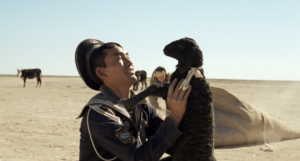
A screenshot from ‘Tulpan,’ starring Askhat Kuchencherekov as Asa.
A stampede of camels groan in the red dust; a dog barks as it streaks past a yurt, in pursuit. This is the opening of Tulpan (2008), a Kazakh narrative film streaming now as part of Filmatique’s Foreign Language Oscar Submissions curation. The film won many awards internationally, including the Prix Un Certain Regardat Cannes, a parallel competition to the Palme d’Or.
Our hero is Asa, recently released from service as a sailor in the Russian Pacific Fleet. He has evidently served near Sakhalin, at the eastern edge of empire, though it is hard to tell what he did, because he is young, a romantic, and somewhat silly. (Trying to impress strangers, he prattles about fighting an enormous octopus underwater and knowing just the right place to bite it between its eyes to keep from being killed.) Now he is home, in Kazakhstan, living with his sister and her family in a yurt, and helping tend their flock of sheep.
Asa has a vision of paradise, which he has drawn on the underside of the jumper flap of his sailor suit: his own flock, a home (with solar panels and a TV with 900 channels), and above all, marriage to a young woman, named Tulpan, from the only other family living nearby. (Asa also dutifully draws a tulip on his suit, which he wears to try to court her.)
His older brother-in-law tries to arrange the marriage for him, offering ten sheep and an ugly chandelier as a start. On the way home, riding in his goofy best friend’s tractor, Asa is drunk with joy. “Look around, Boni, what beauty!” he yells. There is only scrubby desert to the horizon, and more camels. “Attention, sailors!” Asa yells. “Here I’ll put my yurt!”
But his brother-in-law, who in truth does not like him much, stops the tractor to reveal that Asa’s offer has been rejected—due to his protruding ears—and there are no other available women. What’s more, the “Comrade Boss” who runs the district will not allow Asa to have a flock of his own until he has a wife, since “an unmarried man won’t last a week in the Betpak” or steppe without a helpmate. Besides, Asa is not much of a shepherd.
Boni, Asa’s friend, is kind, hardworking, and exuberant. His tractor is plastered with soft porn; he has gold teeth. He has a plan for them, since nothing else is working out: Move to the city, get jobs, live in a dorm if need be, sail to America perhaps, but get on with the modern project, where women are not in short supply. (Interestingly, Tulpan and her mother have dreams of her going to the city, and to college too, though we cannot know if they are any more realistic.)
This is most of the plot of Tulpan. Director Sergey Dvortsevoy, who lived in Kazakhstan for 29 years, had previously made documentaries, so long stretches of Tulpan show his skill in the presentation of the Hunger Steppe. The film goes at the pace of the nomadic people and their landscape, and it is a miracle of actual dust devils rampaging, donkeys humping, and live (and still) births. Reportedly Dvortsevoy made his actors (who were mostly not professional actors) live in the yurt in the desert for a month before filming began.
This all creates a verisimilitude that makes very clear how hard and tenuous life is there, especially for women. The two talented children in the family are already up against the limits of what their talents (voice and memory) will be used for, just as Asa’s imagination and good intentions go to waste.
This is a story of generational change, modernization, and the rural/urban split. It is never made obvious what else the problem might be—collectivization, climate change, the economy—but a way of life is nearly gone, and one young man struggles to find his place in or out of what is left.
The film ends much as it started: A great mass of motion; animals, dust, bells. But no movement whatsoever.
